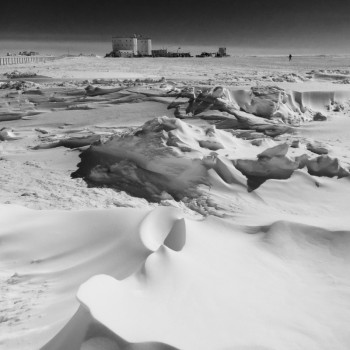ESA-sponsored medical doctor Floris van den Berg recounts his first first weeks in Concordia, from his personal blog:
Breakfast with 57 people, a little static spark almost every time I touch a doorknob, Ski-doo training, being out of breath after walking up only two stairs, a frozen moustache, all weird experiences that I never expected to have and I’m just two weeks into living in this crazy white world.
How did I end up here? Destiny? Fate? Or was it simply the last Basler plane that brought me here from Mario Zuchelli station?
As my first nights of six hours of sleep finally arrive, after so many sleepless nights as my body slowly adapted to the hypoxia, it’s now time for my mind to start adjusting as well. There is a lot to take in and get used in this new environment. To start there is a set daily routine, I don’t think I’ve ever had so much structure in my life! From 7 to 8 am it’s breakfast time, lunch is served at noon and the end of my working day is set with dinner at 7 pm. The structure is all for good reason though, the summer season is a busy time in Antarctica. Up to 70 people will be living and working in and around Concordia Station all at the same time. Since the station was built with just 16 bedrooms, a summer camp is opened to provide a bed for all the summer visitors. It also means that for the next two months, I’ll have a roomie.

Credits: ESA/IPEV/PNRA-F. van den Bergand it seems that snoring is part of the summer package as well…
So when I first stepped out of my plane on arrival here, my beard froze within a single minute! The temperature was -41.4°C with a windchill of -55°C. As the summer proceeds the temperature will rise and stretch the beard-freezing time to about 10 minutes at least! The process of suiting up to go out (polar suit, boots on, gloves, hat, ski glasses and putting outer gloves on) is getting faster, and the sound of the snow under my boots is becoming more and more familiar. When my balaclava freezes, I just turn it around.
I’m getting in the groove and it’s only summer now, so 12 more months to fully contemplate how I ended up here..
Stats: Temperature -28.9°C. Windchill -38.5°C. 24 hours of daylight.





Discussion: 8 comments
Wow! I can’t even start to express how awesome and amazing working in Concordia must be! I’m wondering though, how do you get there? What should be the road of a medical student who, some day, wants to work in such an amazing place like a Polar station? 🙂
Well you are starting well… ESA does regular calls for medical doctors to go to Antarctica, such as here: https://www.esa.int/Our_Activities/Human_Spaceflight/Concordia/Test_spacecraft_piloting_skills_in_Antarctica
Finish your studies, get some experience working in extreme (cold) environments, and follow this blog.
Thank You for such a motivating response! I greatly appreciate all ESA research, people often don’t understand the impact the space exploration have on their everyday life. I’ll do what You suggest 😉 finish my studies, become a medical doctor, and then; Hello Antarctica! (I hope) 😀
I wonder though, how much research experience is needed, and which medical specialty is most needed in Antarctica?
Have a wonderful day!
Feel free to send me an email if you have more questions & good luck with your studies!!
Yours, Floris
floris at bergg.nl
This is a really great read. I know that Mr van der Berg has plenty of science to do. But is there a chance that we get some more details in another blog?
For example how exactly do you get there. I mean i doubt there is an airline going.
How are logistics handled? I mean how often do delivery of supplies take place and how are the goods stored and the like.
And finally, Whats the favorite past time activity down there?
Thanks in advance for the answers!
Hi Kalle,
good to hear you enjoyed reading this. I will post something about logistics soon!
I spend most of my free time in the gym, watch some movies and we have a nice table football competition going on as well 😉
All the best.
Floris
Thanks for the response Floris!
I can imagine that logistics are very challenging.
Since i used to work in logistics i am quite interested on how things are being handled in such harsh conditions.